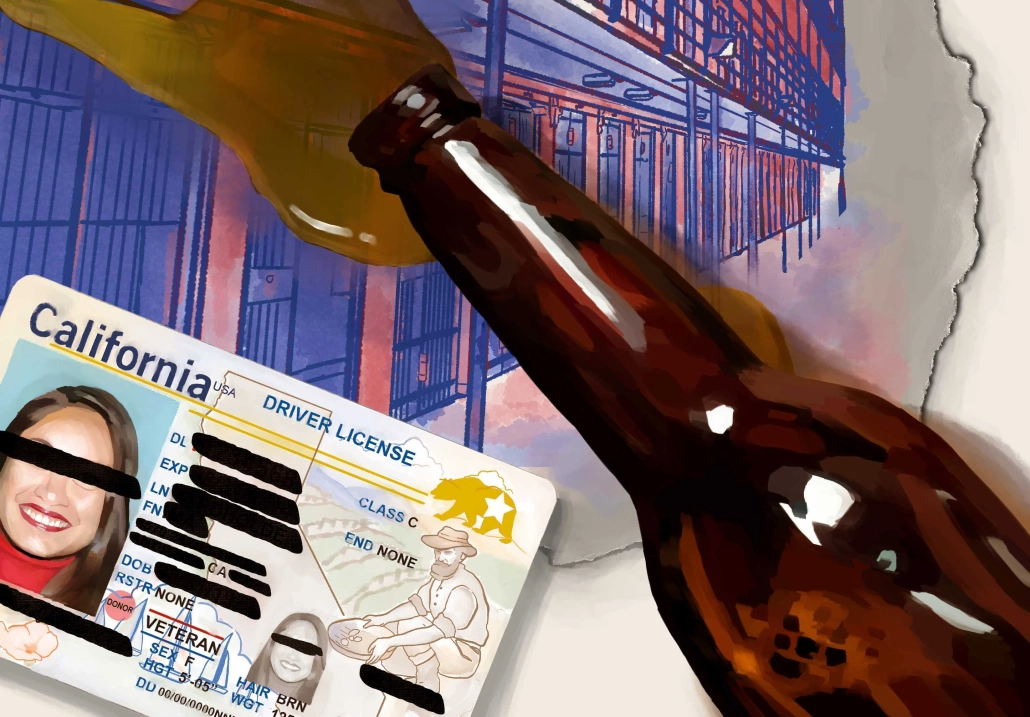PUBLIC DISCLOSURE
Faking it: IDs and MIPs
What Trojans should know about those pesky underage drinking laws.
What Trojans should know about those pesky underage drinking laws.


The weekend starts tomorrow night, which means it’s time to hit the Row, the club or — if you’re on a similar life pace to me — your opinion editor’s living room floor cuddling her unwilling cats!
Whatever way you choose to celebrate Friday’s arrival, chances are you might be engaging with … some substances and liquids! Chances might even be that … you may not be technically, legally old enough to do so yet!
So, for your informational pleasure and in a judgment-free space, I present to you the very college-friendly next topic on “Public Disclosure”: the laws and charges you should know about alcohol, as well as the ubiquitous fake ID. Consider it some light reading before your 21st birthday!
Essential to understanding these kinds of laws is to know that many of them — as well as any attempts you may make to possess, purchase and use alcohol — sit inside multiple state codes, such as the California Business and Professions Code, California Penal Code or the California Vehicle Code. The flagship example is the Minor in Possession charge, the state laws that designate someone under 21 has been caught having too much fun with their Kirkland signature seltzers.
These codes, as you might remember from driver’s ed (which I definitely paid rapt attention to when I was 16) are long and comprehensive lists of statutes surrounding all kinds of criminal, commerce-related or vehicle operating violations, with plenty specifically surrounding the use of substances and DUIs.
That being said, it doesn’t mean you have to be driving to get hit with an MIP ticket; if you’re underage, you could be cited just by walking around on the street, even if it’s an unopened beverage. It’s also legal for police officers to habitually “camp out” in certain areas where they know crime is more likely to be committed, which is why a cop is a common sight on the street during tailgate days or outside of bars and clubs.
To simplify the rest of the matter, the risks and penalties associated with the fake ID (I trust we don’t need a definition here) are almost the same. While it’s not common for most of these “caught red-handed” cases to even reach the arrest or conviction level, with your most likely outcome getting refused service, it’s worth pointing out that it’ll depend on each night’s circumstances. Sometimes, it is indeed fate that decides if the 7-foot-5 bouncer who demands to know your “hometown” ZIP code is in a forgiving mood or not.
Potential consequences of either an MIP or the use of a fake ID: administrative citations, a one-year delay or suspension of your driver’s license, a $250 fine for a first offense, or community service. If convicted, it will appear and remain on your criminal record.
What to consider in and out of California
A huge takeaway you should keep in mind when engaging with your favorite selection of party paraphernalia is just how differently alcohol-related or ID laws can vary in different states: It often has to do with their alcohol manufacturing histories as well as the cultural values of the legislatures that wrote the laws, some of which are over one hundred years old.
Some states consider the MIP charge a felony, while others, including California, consider it a misdemeanor. Some states can sell alcohol any time of the day or night, whereas other states might be so stringent that certain categories of alcohol can’t even be sold on Sundays or past 8 p.m.
Fake ID laws operate similarly: States like Florida and Illinois can consider it a felony if you show a fake, whereas in California, you’ll almost always be charged with a misdemeanor. Additionally, that state could have different laws that might allow workers to confiscate fake IDs and make it a little easier for them to call the cops if they suspect that McLovin Mohammad Fogell from Hawaii isn’t who he says he is.
Disclaimer: This week’s installment is definitely not legal advice to avoid an MIP charge through any untoward methods, especially if you, well, did it. For example, do not flirt with the cop who just handed you a 250 dollar ticket around the corner from University Avenue. Second example: do not make jokes about the movie “Superbad” to the bouncer who currently has a blue flashlight to your “North Dakota” ID. You’ve never been to North Dakota.
CJ Haddad is a junior writing about local, state and federal laws we use in our daily lives. She is also an associate managing editor at the Daily Trojan. Her column, “Public Disclosure,” runs every other Thursday.
We are the only independent newspaper here at USC, run at every level by students. That means we aren’t tied down by any other interests but those of readers like you: the students, faculty, staff and South Central residents that together make up the USC community.
Independence is a double-edged sword: We have a unique lens into the University’s actions and policies, and can hold powerful figures accountable when others cannot. But that also means our budget is severely limited. We’re already spread thin as we compensate the writers, photographers, artists, designers and editors whose incredible work you see in our daily paper; as we work to revamp and expand our digital presence, we now have additional staff making podcasts, videos, webpages, our first ever magazine and social media content, who are at risk of being unable to receive the support they deserve.
We are therefore indebted to readers like you, who, by supporting us, help keep our paper daily (we are the only remaining college paper on the West Coast that prints every single weekday), independent, free and widely accessible.
Please consider supporting us. Even $1 goes a long way in supporting our work; if you are able, you can also support us with monthly, or even annual, donations. Thank you.
This site uses cookies. By continuing to browse the site, you are agreeing to our use of cookies.
Accept settingsDo Not AcceptWe may request cookies to be set on your device. We use cookies to let us know when you visit our websites, how you interact with us, to enrich your user experience, and to customize your relationship with our website.
Click on the different category headings to find out more. You can also change some of your preferences. Note that blocking some types of cookies may impact your experience on our websites and the services we are able to offer.
These cookies are strictly necessary to provide you with services available through our website and to use some of its features.
Because these cookies are strictly necessary to deliver the website, refusing them will have impact how our site functions. You always can block or delete cookies by changing your browser settings and force blocking all cookies on this website. But this will always prompt you to accept/refuse cookies when revisiting our site.
We fully respect if you want to refuse cookies but to avoid asking you again and again kindly allow us to store a cookie for that. You are free to opt out any time or opt in for other cookies to get a better experience. If you refuse cookies we will remove all set cookies in our domain.
We provide you with a list of stored cookies on your computer in our domain so you can check what we stored. Due to security reasons we are not able to show or modify cookies from other domains. You can check these in your browser security settings.
These cookies collect information that is used either in aggregate form to help us understand how our website is being used or how effective our marketing campaigns are, or to help us customize our website and application for you in order to enhance your experience.
If you do not want that we track your visit to our site you can disable tracking in your browser here:
We also use different external services like Google Webfonts, Google Maps, and external Video providers. Since these providers may collect personal data like your IP address we allow you to block them here. Please be aware that this might heavily reduce the functionality and appearance of our site. Changes will take effect once you reload the page.
Google Webfont Settings:
Google Map Settings:
Google reCaptcha Settings:
Vimeo and Youtube video embeds:
The following cookies are also needed - You can choose if you want to allow them:
